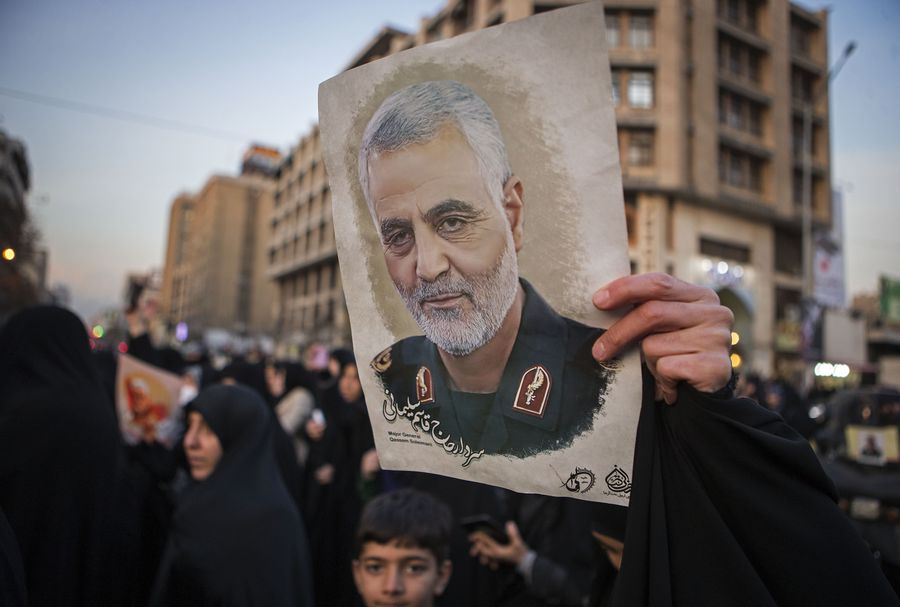
A protestor holds a picture of Iranian commander Qassem Soleimani during a protest in Tehran, Iran, Jan. 12, 2020. (Photo by Ahmad Halabisaz/Xinhua)
The risk is that "there will be a wave of attacks and counter-attacks that never end. Each side will cite the other country's aggression to justify its own actions," said Darrell West, a senior fellow at the Brookings Institution.
by Matthew Rusling
WASHINGTON, Jan. 14 (Xinhua) -- Long-standing U.S.-Iran tensions may continue after the tit-for-tat fight between Washington and Tehran in recent weeks, experts have said in recent interviews.
The U.S. government said Friday that it has imposed fresh sanctions on Iran, days after Tehran's missile attacks on U.S. military bases in Iraq.
U.S. President Donald Trump said Friday in a White House statement that the measures are aimed at denying Iran revenue that "may be used to fund and support its nuclear program, missile development, terrorism and terrorist proxy networks, and malign regional influence."
Tensions between Tehran and Washington have reached new heights since the United States killed top Iranian military commander Qassem Soleimani near Baghdad's airport on Jan. 3.
"Multiple armed organizations in the Middle East worked with General Soleimani and declared after his killing that they will attack U.S. forces or facilities," Clay Ramsay, a researcher at the center for international and security studies at the University of Maryland, told Xinhua.
"If these attacks come, the U.S. leadership will have to decide whether to retaliate against Iran or only against the specific attacker," Ramsay said.
Darrell West, a senior fellow at the Brookings Institution, told Xinhua that the risk is that "there will be a wave of attacks and counter-attacks that never end. Each side will cite the other country's aggression to justify its own actions."
Trump's words on Twitter signaled that the U.S. has no intention of defusing the "maximum pressure" on Iran. On Sunday Trump expressed his support on Twitter for protests in Iran, after Tehran admitted that its armed forces had accidentally shot down a Ukrainian passenger plane, killing all 176 people on board.
Michael O'Hanlon, also a senior fellow at the Brookings Institution, told Xinhua that while Iran "won't want a war," it may ramp up attacks on military facilities or oil-related infrastructure.
However, confrontation does not have to be a foregone conclusion, Ramsay believes, adding that numerous steps could be taken to reverse the spiral of escalation.
"There are lots of possible steps that could be taken quietly on each side. The U.S. could pick spots to relax its controls on the use of dollars by the Iranian Central Bank, allowing the real purchase and delivery of medical and humanitarian goods," Ramsay said.
"The United States could also allow some oil transactions to take place. Iran could hold off on the steps it announced a few days ago about moving away from the nuclear deal and it could privately discuss these with the International Atomic Energy Agency," he added.
It is "not clear what Trump's long term strategy is with Iran," West said.
"Although Trump says he wants to avoid Middle Eastern entanglements, he already has sent additional troops to that region and may have to send more to protect American interests," West said. ■



